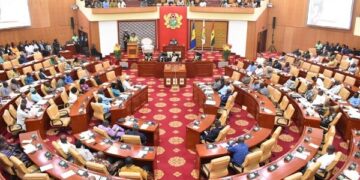Ghana’s currency, the cedi, is currently at the mercy of the International Monetary Fund (IMF), as the country seeks to secure a $3bn bailout programme to address its macroeconomic challenges.
The performance of the cedi is intricately linked to the outcome of Ghana’s negotiations with the IMF, as failure to secure the programme by the end of March could result in a significant depreciation of the currency.
This is according to Joe Jackson, Director of Operations at Dalex Finance, who suggests that the cedi will only experience a marginal reduction in value if there is a positive indication of progress made by the IMF in relation to Ghana’s efforts in attaining the bailout programme.
Ghana’s negotiations with the IMF have been ongoing for several months, with the country being requested to restructure both its domestic and external debts worth over GHS 570bn ($46bn) as part of the conditions for securing the programme. However, there is a stumbling block in the form of an approval from the Executive Board of the IMF, which Ghana is yet to secure.
Despite this, Jackson believes that the government’s insistence on not reducing its expenditure and size is unlikely to affect its ability to secure the bailout programme, as this issue is only relevant to ongoing negotiations with creditors for a favourable debt restructuring programme for the country.
In the meantime, the cedi’s performance has been mixed, with some market information firms projecting a further weakening of the currency.
Last week, the cedi strengthened in value against the dollar and other major foreign currencies on the forex market due to increased foreign exchange liquidity, with the Bank of Ghana selling about $7 million on the spot market as against $5.2 million the previous week.
However, the announcement of an emergency lending facility by the US Federal Reserve to shore up US banks’ reserves and pay all the customers of collapsed Silicon Valley Bank may strengthen the dollar going forward, which could have an impact on the cedi’s performance.
Overall, the outlook for the cedi remains uncertain as Ghana’s negotiations with the IMF continue. The country’s ability to secure the bailout programme will be crucial in determining the future performance of its currency.
However, it is clear that the cedi is vulnerable to external factors such as the strength of the dollar, and any further developments in this regard may have an impact on the currency’s value. In the meantime, investors and stakeholders in the Ghanaian economy will be closely monitoring the outcome of Ghana’s negotiations with the IMF, and the subsequent performance of the cedi. Norvanreports




















































































